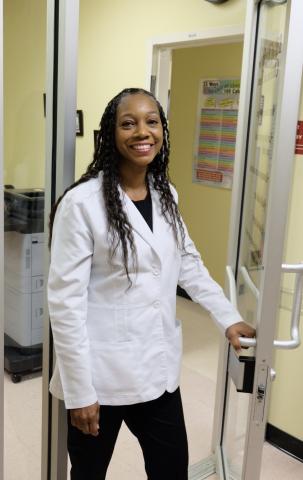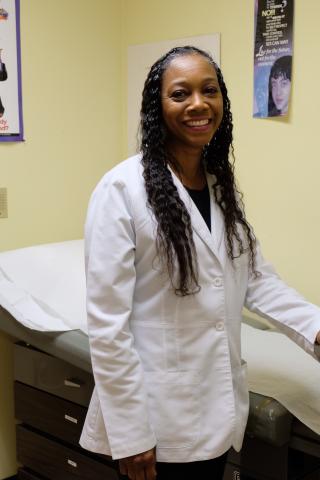Dr. Iris Malone’s passions are chronic disease prevention and education.
The experienced nurse practitioner draws upon that passion every day through her role in Our Lady of Lourdes community service department, providing primary care services to students and faculty at Northside High School and health education to the community.
“I enjoy primary care because I like people to know about their health and how to stay healthy, understand their condition,” Dr. Malone says. “Many times people just don’t know how to care for themselves. I find if they understood their health conditions, then they would know how to prevent further injury or further complications and be more compliant with treatment plans.”
Advanced Understanding, Advanced Practice
The best way to help patients understand their diseases, Dr. Malone says, is for nurse practitioners to seek ways to improve their own understanding.
“I think it’s important for us as nurse practitioners to be able to keep up with the current guidelines so we’re better able to inform our patients and the community about their health,” she says.
So when Dr. Malone learned the University of Louisiana at Lafayette was offering an online Graduate Certificate in Cardiovascular Nursing for advanced practice nurses, she enrolled.
“Working in adolescent school-based health center, I find more young people are being diagnosed with chronic illnesses,” she says. “I always want to stay on the forefront of current health issues. So I was very interested in the cardiovascular nursing program.”
She says she also appreciated the support of Cardiovascular Institute of the South, which funded stipends for qualified students and provided its facilities for clinical rotations.
Dr. Malone says having the opportunity to gain perspective of a specialty hospital setting was especially valuable because she’s primarily worked in a clinic setting during the last 17 years.
“I like to visualize and see what my patients would go through and see what’s out there to help me better understand so I can paint a picture for them. The more I see, the more I can inform them,” she says.
“We have a lot of young people with heart disease and chronic illnesses that impact their health, but it doesn’t need to get to that point. That’s a passion of mine — to know as much as I can as a primary care provider to help people before their conditions get worse.”
Sudden Cardiac Arrest Intervention
One of the ways undetected cardiovascular conditions can affect young people — Dr. Malone’s primary patient population — is through sudden cardiac death.
Lafayette has experienced its share of tragedy, losing young athletes, including Acadiana High School student Shane Ozene, 15, and Holy Family School student Teddy Daigle, 14.
Both boys were playing basketball when they suffered fatal cardiac episodes — Ozene in 2011, Daigle in 2015.
In response, State Rep. Vincent Pierre, D-Lafayette, sponsored The Teddy Daigle-Shane Ozene Act to require automatic external defibrillators in all high schools in parishes with 200,000 to 250,000 residents. The law took effect Jan. 1, 2018.
 But Dr. Malone wants to intervene before an AED is needed.
But Dr. Malone wants to intervene before an AED is needed.
Northside’s on-campus clinic currently has two exam rooms and a lab so staff can provide wellness exams and athletic physicals, as well as treat students for acute and chronic illnesses — at no cost to students or parents.
To bolster its capabilities, Dr. Malone wrote a grant that’s been funded by the Franciscan Missionaries of Our Lady Health System to allow the health center to purchase an echocardiogram machine and an EKG machine.
Along with cardiologist Dr. Brent Rochon, medical director for Northside’s health center, Dr. Malone says they intend to implement a cardiac screening program using that equipment.
“We’ve had at least four students at a local level die from sudden cardiac arrest,” Dr. Malone says. “These are kids who were probably never screened to know whether or not they have that particular heart condition that might cause cardiac arrest.”
Cardiovascular Disease Prevention
Dr. Malone says she had students in mind when enrolling in the cardiovascular nursing graduate program, “because I wanted to learn more about the heart, about the heart valve functions, how to interpret a 12-lead EKG, cardiac arrhythmias, and different types of cardiac diseases.”
While the program equips nurse practitioners interested in specialized cardiovascular care, Dr. Malone says all family nurse practitioners can benefit by gaining in-depth knowledge in this area to improve the quality of care delivered to their patient population.
She said because Northside’s student population is predominantly black, her patients are at a higher risk of hypertension and stroke down the road. By having conversations about cardiovascular disease prevention now, she says she can work with students to lower their risk.
“As a primary care provider, we see a lot of people with those chronic illnesses — diabetes, chronic renal failure, cardiovascular. We have to be able to enrich and improve our knowledge base so we can explain to our patients what’s going on with them,” she says.
“For me, it expanded my awareness of cardiovascular nursing — how to treat patients in the office and how to connect them with a specialist when the time comes.”
In only six months, the University of Louisiana at Lafayette’s online Graduate Certificate in Cardiovascular Nursing program equips MSN-prepared nurse practitioners with cardiovascular diagnostic and treatment knowledge to advance their practices. Stipends may be available for qualified students. The next cohort begins courses in March.
Request more information today.